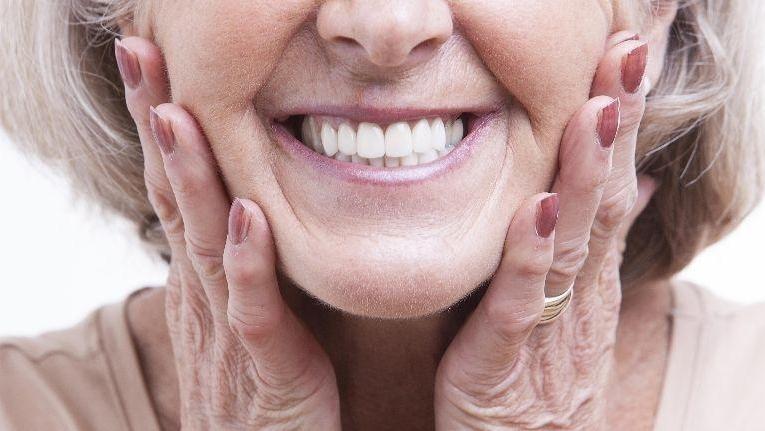
Children’s dental care receives a lot of attention at school and on TV programming. It is definitely important to teach kids about dental care and help them establish healthy habits early in life. However, far less attention is placed on dental care for senior adults. There are unique challenges that some senior adults experience that make dental education extremely important for this population.
Common Concerns
A common problem we see in our practice that can be devastating to the teeth of senior adults is dry mouth, or xerostomia as it is known in the scientific literature. This is where the body produces an inadequate supply of saliva, leaving the mouth to feel dry, sticky, and often uncomfortable.
As many of us are living longer, we are also taking more and more medications to treat certain health conditions. Unfortunately, a side effect of many of these medications is dry mouth. In particular, blood pressure medications, allergy medications, certain antidepressants, certain pain medications, and muscle relaxants are well known to contribute to dry mouth. Taking multiple medications can make this problem even worse.
Furthermore, certain health conditions such as diabetes can contribute to dry mouth. People who are undergoing chemotherapy or who have radiation to the head and neck area are very  likely to experience temporary or even permanent dry mouth.
likely to experience temporary or even permanent dry mouth.
Reduced saliva flow can interfere with chewing, swallowing, speaking, and even with the sense of taste. However, even if someone is not experiencing discomfort, dry mouth puts someone at a much higher risk of dental decay.
Saliva helps to cleanse the mouth by washing away food particles after eating. It also contains enzymes to help neutralize the acidity in the mouth caused by certain foods and contains proteins that fight the bacteria that cause cavities. Without enough saliva, food tends to stick to teeth, acids build up, and bacteria use this to cause cavities. The cavities that are caused by dry mouth tend to be get very big very quickly, and they often occur in places on the tooth that are difficult to fix.
It’s sad for us at the dental office to see a patient who has always taken great care of their teeth start to get cavities as a result of dry mouth. They haven’t changed anything about their dental care or their diet. But unfortunately, as a result of new medications or other health problems, their dry mouth begins to cause big problems for them. Often they may not even be aware of the cavity issues until it is very far gone.
Luckily, there are a lot of preventative options available for people with dry mouth to help keep it from damaging their teeth. There are also medications and therapies to help deal with the discomfort that people can have with dry mouth. If you are experiencing dry mouth or are taking several different medications and think you may be at risk for dry mouth, contact our office and we would be happy to discuss treatment options with you.
Gum Disease in Senior Patients
Another oral health condition that we see frequently among our senior patients is gum disease (also known as periodontal disease). Gum disease occurs when plaque accumulates along the gum line and is not adequately removed. It can harden over time to a substance called tartar or calculus. Ultimately, this plaque and tartar collects bacteria, which in turn cause an inflammatory process in the body that destroys the gum and bone support and attachment. Over time this can cause pain and loss of teeth. Gum disease is the chief cause of tooth loss in adults.
If tooth loss isn’t scary enough, there is a lot of scientific evidence connecting the presence of gum disease to other serious health conditions, including heart disease, stroke, pneumonia, and diabetes. People with diabetes especially need to be aware of gum disease. Diabetics are at higher risk of gum disease. In addition, several studies have shown that diabetics who have their gum disease treated appropriately are better able to control their blood sugar.
We routinely screen our patients for gum disease and have plenty of options to treat and mitigate the problems associated with it.
Tooth Replacement Options Where Needed
One last issue I’d like to make senior adults aware of is newer options for tooth replacement. If you lost one or even all of your teeth in the past, you may not be aware of dental implant technology. Dental implants are essentially titanium tooth roots that go back into areas where you have lost a tooth or teeth. Dental implants can be attached to a crown or bridge to replace certain teeth. They can also be used to anchor a denture in place for people who have lost all of their teeth.
The procedure has become more affordable and predictable in recent years. Most people experience little to no discomfort when the implants are placed, and with good dental care, they can be expected to last for years and years.
Our Dental Office
We are proud to offer a wide array of services under one roof for our patients of all ages, and we can help you achieve a happy, healthy smile. Give our office a call today if you have any questions, or to schedule an appointment!

